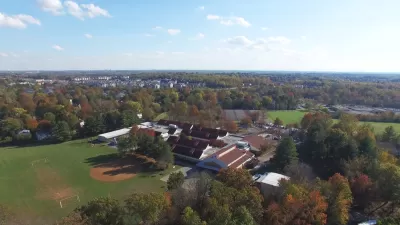A planning change would make it easier to develop housing near transit in Montgomery County, Maryland. In 2018, the county adopted a development moratorium intended to prevent overcrowding in schools.

"On July 30, the Montgomery Planning Board voted on a new growth policy known as the Subdivision Staging Policy. If approved by the County Council, the county would — with one exception — no longer ban new housing in areas with overcrowded schools," reports Jane Lyons.
Montgomery County adopted a building moratorium in 2018 (and implemented the moratorium in 2019) in parts of the county, where schools are reportedly overcrowded, like Silver Spring, Wheaton, and part of Bethesda.
According to the analysis of both Lyons and the Planning Board, the moratorium was ineffective for controlling school crowding. [O]ver 70% of school enrollment growth can be attributed to 'neighborhood turnover,' or single-family homes without school-aged children being sold to young families," explains Lyons, citing data from Montgomery Planning.
"However, there are still parts of the county (see: Clarksburg) where new development is the driving force behind enrollment growth. These areas would be classified as 'Greenfield Impact Areas,'" according to Lyons. The new growth policy "would apply an automatic housing moratorium to greenfield areas and raise the moratorium threshold from 120% to 125% projected school utilization." Some exceptions, explained by Lyons, are also included in the Greenfield Impact Areas.
Another key feature of the new growth policy is an allowance for Utilization Premium Payments to be paid by developers in parts of the county where development would potential add students to already crowded schools. Utilization Premium Payments would be "an extra charge on top of the regular tax that developers must pay for school impacts," reports Lyons.
The plan also allows for school impact taxes to be lowered in parts of the county where growth is desired.
FULL STORY: Montgomery County takes a major step toward ending a housing moratorium

Maui's Vacation Rental Debate Turns Ugly
Verbal attacks, misinformation campaigns and fistfights plague a high-stakes debate to convert thousands of vacation rentals into long-term housing.

Planetizen Federal Action Tracker
A weekly monitor of how Trump’s orders and actions are impacting planners and planning in America.

In Urban Planning, AI Prompting Could be the New Design Thinking
Creativity has long been key to great urban design. What if we see AI as our new creative partner?

King County Supportive Housing Program Offers Hope for Unhoused Residents
The county is taking a ‘Housing First’ approach that prioritizes getting people into housing, then offering wraparound supportive services.

Researchers Use AI to Get Clearer Picture of US Housing
Analysts are using artificial intelligence to supercharge their research by allowing them to comb through data faster. Though these AI tools can be error prone, they save time and housing researchers are optimistic about the future.

Making Shared Micromobility More Inclusive
Cities and shared mobility system operators can do more to include people with disabilities in planning and operations, per a new report.
Urban Design for Planners 1: Software Tools
This six-course series explores essential urban design concepts using open source software and equips planners with the tools they need to participate fully in the urban design process.
Planning for Universal Design
Learn the tools for implementing Universal Design in planning regulations.
planning NEXT
Appalachian Highlands Housing Partners
Mpact (founded as Rail~Volution)
City of Camden Redevelopment Agency
City of Astoria
City of Portland
City of Laramie





























